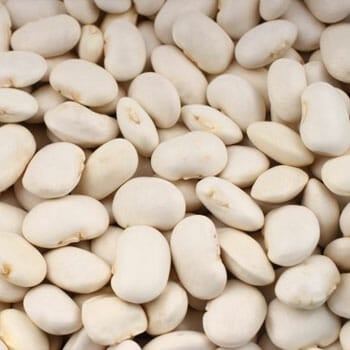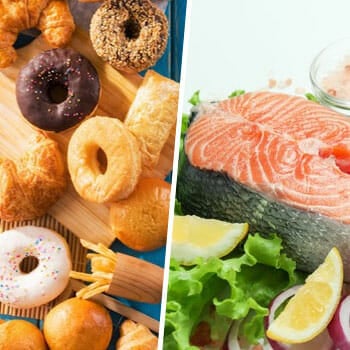With so many fat-burning supplements on the market, knowing the difference between them all can be a huge headache.
Fat burners all look toward achieving the same end result, assisting with fat loss and preventing weight gain.
Where the various fat burner types differ is in their approach to doing so.
I’ve spent hours delving into the research and science behind the different types of fat burners, so you know exactly what’s right for your system.
Quick Summary
- Seven different types of fat burners are thermogenic, stimulant-free, appetite suppressants, carbohydrate blockers, fat blockers, thyroid-regulating fat blockers, and cortisol blockers.
- Thermogenic fat burners, for instance, work by increasing the body's basal metabolic rate (BMR) through a process called thermogenesis.
- According to studies published in the Journal of the International Society of Sports Nutrition, thermogenic supplements can significantly elevate resting metabolic rate (RMR) compared to a placebo.
- Personally, I find that a balanced approach combining fat burners with regular exercise and a healthy diet yields the most sustainable weight loss results.
7 Different Fat Burner Types

The most popular fat burner types include burners, suppressants, and blockers, which help burn fat in different ways.
Fat burners are dietary supplements designed to help you fast track your fat loss journey.
Fat burner supplements are very effective at what they do, making them popular amongst athletes and workout fanatics.
Different types of fat burners help you with fat loss through various methods.
Recognizing that every individual's body and fitness journey is unique, the selection of a fat burner should be tailored to one's specific metabolic needs, body composition, and personal health goals, ensuring a more effective and personalized approach to weight loss.
While primarily focused on physical weight loss, it's crucial to consider the potential impacts of fat burner supplements on mental health, exploring how certain ingredients might influence mood, stress levels, and cognitive functions.
Below are some of the most popular fat burners.
1. Thermogenic Fat Burners

Thermogenic fat burners stimulate thermogenesis, a process that converts food into heat, thereby increasing your body's calorie-burning rate, known as the basal metabolic rate (BMR).
In my experience, thermogenic fat burners have been effective for clients looking to boost their calorie burn.
This leads to an elevated metabolism and higher body temperature, enhancing calorie expenditure.
As a result, the body burns calories at a faster rate, helping people boost their caloric expenditure.
In my experience, thermogenic fat burners have been effective for clients looking to boost their calorie burn.
Most thermogenic supplements come with a variety of active ingredients depending on the manufacturer. Common ingredients include:
- Caffeine - an organic psycho-active stimulant naturally found in tea, coffee, and cocoa. It can increase metabolism significantly, making it the most common ingredient found in fat burners. Though caffeine is an effective ingredient, its benefits fade over time as the body develops a tolerance for it.
- Capsaicin - a compound found in hot peppers responsible for their spicy taste. Capsaicin stimulates the brain to release adrenaline which in turn will increase metabolism. With an increased metabolic rate, your body burns more fat for energy which will eventually lead to less weight on your body.
- Conjugated Linoleic Acid (CLA) - a poly-unsaturated fatty acid found in vegetable oils and dairy products. CLA supplements help with fat loss by inhibiting fat production and enhancing the breaking down of stored fat.
- Theacrine - a component found in some blends of tea and coffee. Theacrine shares many similarities with caffeine in terms of molecular structure, thermogenic effects, and psycho-stimulation effects.
Thermogenic Fat Burner Side Effects
Due to their stimulation effects, a thermogenic fat burner is often associated with risks such as increased heart palpitations, insomnia, and anxiety.
According to studies published in Journal of the International Society of Sports Nutrition [1]:
“When the participants ingested the thermogenic dietary supplements treatment, they experienced greater elevations in RMR values as compared to baseline, whereas no elevations in RMR were observed following the placebo treatment… due to the elevations in systolic blood tension, caution should be taken for those with increased risk for hypertension or pre-hypertension.”
- Bill I. Campbell, Performance & Physique Researcher
As a result, people with medical conditions such as hypertension or heart issues should be cautious when using thermogenic burners.
As a result, the body burns calories at a faster rate, helping people boost their caloric expenditure.
Most thermogenic supplements come with a variety of active ingredients depending on the manufacturer. Common ingredients include:
- Caffeine - an organic psycho-active stimulant naturally found in tea, coffee, and cocoa. It can increase metabolism significantly, making it the most common ingredient found in fat burners. Though caffeine is an effective ingredient, its benefits fade over time as the body develops a tolerance for it.
- Capsaicin - a compound found in hot peppers responsible for their spicy taste. Capsaicin stimulates the brain to release adrenaline which in turn will increase metabolism. With an increased metabolic rate, your body burns more fat for energy which will eventually lead to less weight on your body.
- Conjugated Linoleic Acid (CLA) - a poly-unsaturated fatty acid found in vegetable oils and dairy products. CLA supplements help with fat loss by inhibiting fat production and enhancing the breaking down of stored fat.
- Theacrine - a component found in some blends of tea and coffee. Theacrine shares many similarities with caffeine in terms of molecular structure, thermogenic effects, and psycho-stimulation effects.
2. Stimulant-Free Fat Burners

Stimulant-free fat burners work by supplementing the body with an energy boost and increasing metabolism.
They provide a continuous supply of energy to push you through the entire day while torching extra calories.
I've seen clients who are sensitive to caffeine benefit greatly from stimulant-free fat burners, offering a gentler approach to weight loss.
These supplements can be taken at any time of the day without worrying about issues like insomnia associated with caffeine.
Additionally, these types of fat burners provide a way for burning fat without using stimulant ingredients.
They mostly contain natural ingredients to encourage weight loss effects without the risks associated with overstimulating the body.
Common ingredients in stimulant-free formulas include:
- Fucoxanthin - a dietary supplement extracted from marine sources such as brown seaweed. Once ingested, the compound hinders the growth of fatty tissues and helps reduce abdominal fat. Fucoxanthin also increases glucose metabolism in bodily tissues, thereby lowering cholesterol levels in the body.
- Raspberry Ketones - a naturally occurring compound in raspberries that gives them their sweet aroma. They are often used as an additive to weight loss formulas due to their flavor and ability to induce fat-burning effects.
- Forskolin - a compound extracted from the roots of a plant in the mint family. Forskolin helps reduce body fat and stimulates the development of lean muscle and strong bones.
3. Appetite Suppressants

Our brain signals hunger to meet energy needs, but sometimes these signals can be misleading, leading to unnecessary cravings.
Appetite suppressants help manage this by targeting ghrelin and leptin, the hormones that regulate feelings of hunger and fullness.
From my training experience, appetite suppressants can be a game-changer, especially for clients struggling with cravings.
Reducing your appetite and cravings for junk food leads to a lower caloric intake and prevents weight gain.
In addition, appetite suppressants also create a caloric deficit, which forces the body to burn fat reserves to meet energy demands, further helping you burn body fat.
From my training experience, appetite suppressants can be a game-changer, especially for clients struggling with cravings.
Examples of appetite suppressants made from natural ingredients include:
- Green Tea Extract - made from tea leaves which contain caffeine and epigallocatechin gallate (EGCG) as its main components. EGCG has been proven to have a positive impact on hunger, caloric intake, and appetite control.
- Glucomannan - a water-soluble dietary fiber extracted from the roots of giant yam. Glucomannan possesses exceptional properties which allow it to absorb large volumes of water.
This allows it to take up space in your stomach, helping you feel sated as well as suppressing appetite.
4. Carbohydrate Blockers

Carbohydrate blockers prevent the body from digesting and absorbing simple sugars by inhibiting specific enzymes.
This process allows carbohydrates to pass through your system without being absorbed, thereby reducing calorie intake, aiding in fat burning, and contributing to overall health improvement.
I've noticed that clients using carbohydrate blockers often find it easier to manage their diet without cutting out carbs entirely.
There are two main types of carb blockers:
- White Kidney Bean Extract - an over-the-counter dietary supplement that inhibits the production of the enzyme amylase, responsible for the digestion of carbohydrates.
- Alpha-glucosidase Inhibitors (AGIs) - a prescription medication used to treat type II diabetes. AGIs target the alpha-glucosidase enzymes in the small intestines and prevent carbs from being absorbed into the bloodstream.
5. Fat Blockers

Fats are a major component of our daily meals and play a huge role in our bodies, responsible for maintaining skin and hair health and insulating delicate body organs like the brain.
Despite its importance, fat is required in minimal amounts.
Excessive amounts of fat get deposited into the body’s fat cells, which lead to weight gain and various health complications.
Fats can be classified into three categories:
- healthy fats from vegetables and fish
- unhealthy saturated fats from junk foods and sugars
- bad fats - aka trans fats, which increase disease risk and harm your body
Similar to carb blockers, fat blockers work by blocking the digestion and absorption of fats by targeting digestive enzymes. These undigested fats are then excreted from the body.
As fat blockers prevent fats from being broken down and absorbed, they aid with weight loss and prevent health issues associated with excess fats.
In my practice, fat blockers have helped clients reduce fat intake without overhauling their entire diet.
6. Thyroid-Regulating Fat Blockers

Thyroid-regulating fat blockers are beneficial when the thyroid gland, which governs metabolism and digestion, underperforms.
This underperformance can slow metabolism, leading to challenging fat loss, fatigue, and low energy.
These blockers aid the thyroid gland, helping to normalize metabolic functions.
Many of these metabolism boosters also come with metabolic enzymes to help balance the deficit due to thyroid inactivity.
Clients with sluggish thyroid function have shown improvement in metabolism with thyroid-regulating fat blockers, based on my observations.
7. Cortisol Blockers

Daily stress can lead to the release of cortisol, a hormone that, when overproduced, can cause weight gain, sleep disturbances, anxiety, and high blood pressure.
Elevated cortisol levels can make weight management challenging by promoting fat retention and altering blood sugar levels.
To balance things out, you crave snacks and sugary foods that are very high in calories, which further makes it extremely difficult to shed weight as you’ll constantly be eating foods that only make things worse.
Cortisol blockers work by inhibiting the release of cortisol, which helps you control stress-related binging on junk foods and sweets. They can either be in the form of over-the-counter prescription drugs or natural supplements such as tea extract and L-carnitine.
I've seen cortisol blockers work wonders for clients under high stress, helping them manage weight more effectively.
Cortisol Blockers Side Effects:
Prolonged use of cortisol blockers can affect one's response to stressful situations.
Related article: What are the Pros & Cons of Fat Burners?
FAQs
Which Fat Burner Is Best For Weight Loss?
Each type of fat burner has its own unique properties that aid with effective weight loss. Those who wish to minimize side effects may choose natural supplements such as a stimulant-free fat burner or a vegan fat burner.
What Are the Best Natural Fat Burners?
Caffeine and green tea fat-burning pills are absolute favorites when it comes to natural fat burners. They are easy to obtain and produce exemplary results through years of extensive research.
How Often Should I Take Fat Burners?
For most fat-burning pills, a single dose is enough to sustain you throughout the day.
It is also advisable to take fat burners in the morning - preferably before breakfast or right before hitting the gym: to burn more calories while you are most active.
If you plan to take fat burner at night, here is the list of the best nighttime fat burners.
Start Melting the Body Fat Today: Fat Burner Supplements Alongside a Healthy Diet
If you’re looking to build lean muscle mass and lose body weight, taking fat burners can assist with your body transformation goals.
As effective as they may be, don’t rely solely on a fat burner to bring you the fat loss results you’re after.
Combined with a balanced diet and regular exercise, you’ll shred through stubborn pounds and improve your general health at the same time.
Let us know what your favorite type of fat burner is.
References:
- https://www.ncbi.nlm.nih.gov/pmc/articles/PMC4815210/
About The Author
You May Also Like






